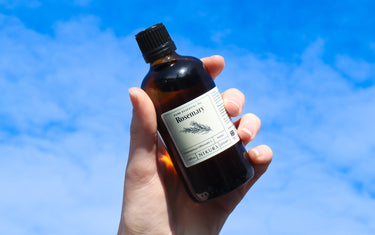Rosemary Oil Uses
Rosemary oil is celebrated for its versatility, making it a valuable addition to your natural self-care routine. Here are just a few of its uses:
-
Aromatherapy: Add 5–10 drops of rosemary oil to a diffuser to create a refreshing and uplifting atmosphere, perfect for focus and relaxation.
-
Hair Care: Mix a couple of drops of rosemary essential oil into your regular shampoo or conditioner to enhance your hair care routine.
-
Skincare: Add a drop of rosemary oil to your daily moisturiser to complement your skincare routine and support a refreshed appearance.
-
Relaxation: Add 5–7 drops to a warm bath to enjoy the herbaceous aroma and create a tranquil atmosphere.
Rosemary Oil for Specific Hair Types
Who should not use rosemary essential oil
Rosemary essential oil is generally well-tolerated, but some individuals should take precautions to avoid potential adverse reactions:
-
Sensitive Scalps: Those with sensitive scalps may experience irritation or discomfort when using rosemary essential oil, especially if not diluted adequately.
-
Pre-existing Scalp Concerns: Individuals with conditions such as psoriasis, eczema, or dermatitis should consult a healthcare professional before using rosemary essential oil, as it may not be suitable for these conditions.
-
Allergies: People allergic to rosemary or similar plants, such as basil, mint, or lavender, should avoid using rosemary essential oil to minimise the risk of allergic reactions.
-
Specific Groups: Pregnant individuals, those with epilepsy, or people with high blood pressure should seek medical advice before using rosemary essential oil to ensure it is appropriate for their individual circumstances.
What hair types should avoid using rosemary oil?
Individuals with very dry or sensitive scalps should approach the use of rosemary essential oil cautiously.
To minimise the risk of adverse effects, it is essential to dilute rosemary essential oil with a carrier oil, such as coconut or jojoba oil, before applying it to the scalp.
Conducting a patch test prior to use is recommended to identify any potential sensitivity.
For those with pre-existing scalp concerns or particularly delicate hair, consulting a dermatologist or healthcare professional can provide personalised advice on safe and effective use.



























